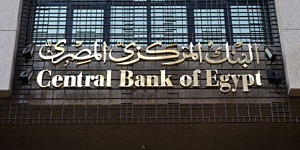Egypt's central bank left its key interest rates on hold for the third time in a row, as expected, and said inflation is expected to drop after the impact of temporary effects subside, helped by its preemptive monetary policy actions, absorption of liquidity and favorable base effects.
The Central Bank of Egypt (CBE) surprised financial markets in November last year by hiking its policy rates, including the benchmark overnight deposit rate, by 300 basis points as part of a liberalization of foreign exchange markets. This took last year's rate rises to a total of 550 points.
Egypt's headline inflation rate soared to 28.1 percent in January, the highest since December 1989, from 23.3 percent in December last year as government reform measures, including higher custom tariffs, changes to hydrocarbon subsidies and higher import prices, push up consumer prices.
It is the third month in a row of accelerating inflation and compares to a rate of 19.4 percent in October, before the Egyptian pound was allowed to float on foreign exchange markets.
Core inflation, which excludes fuel and food, rose to 30.86 percent from 25.86 percent in December.
"Developments in the external environment show that there has been some firming of international commodity prices, while low global inflation and subdued global growth, albeit recovering, maintain weak pressures on domestic prices," the CBE said.
The scrapping of the currency peg immediately hit Egypt's pound, but during the last month it has been firming as foreign investors purchase stocks and government bills.
A rising pound should help reduce the costs of imports and thus inflation which has soared in the wake of the pound's depreciation and government reform measures, such as reduced price subsidies.
The pound was trading at 16.1 to the U.S. dollar today, up 12.4 percent since the start of this year but still down 45 percent since last October, days before it was allowed to float from its peg of around 8.8 to the dollar on Nov. 3. Prior to full liberalization, the CBE in March 2016 devalued the pound by almost 14 percent, to 8.95 per dollar.
Egypt's economy has been suffering since the Arab Spring and popular uprising in 2011 that led to the overthrow of Hosni Mubarak and scared off foreign tourists and investors.
Economic output slowed to growth of 3.4 percent in the first quarter of the 2016/17 financial year, which began on July 1, after averaging 4.3 percent in 2014/15 and 2015/16.
Slower growth was mainly due to consumption while fixed investments were steady while higher private investment offset lower public investment.
The drag from a negative contribution of exports narrowed as exports recovered for the first positive contribution to Gross Domestic Product since the second quarter of 2014/15 while the negative contribution of imports lessened, CBE said.
In addition, unemployment continued to decline, falling to 12.4 percent in the second quarter of 2016/17 from a peak of 13.4 percent in the second quarter of 2013/14.





















































